#maintenance phase is such an amazing podcast
Note
Bitches I need some advice.
I'm fat, okay? I'm not ashamed about it. It just... Is. I'm fat.
Being fat is also fucking me up. It's causing me sleep problems, it's fucking my joints, I can't walk as far as I used to, I haven't run in years.
I want to lose weight. Not for anyone else. For me. I want to be fit again.
I'm surrounded by people telling me I'm "not fat" and need to "love myself like I am". I'm 210lb and 5'3". Ya girl is fat. And I'm okay with that it's not a bad word. I love myself. But I also love the things I used to be able to do when I was fitter. It's just really fucking hard.
I've got zero support left and right. And I don't know what to do. I know this isn't your area of expertise, but you're such great internet mamas that maybe you can help.
My darling child, we are SO humbled that you came to us with this. And while this isn't an area of our OFFICIAL expertise... weight and athleticism is something that I, Piggy, personally think a lot about! So let me see if I can offer some support to you, my beloved fat child.
By way of background: I have never been fat. Heavier than I want currently, but not fat. So I don't completely understand what you're going through. I have always been an athlete of one sort or the other. But more than that, I have always had the privilege of being relatively skinny without trying. At peak fitness I was running and rock climbing and doing all the stretchy and weight-trainy stuff. I was 5'5" and 130 lbs of jacked Bitch.
I am also a proud Italian American woman, which means that after 30 genetics decreed that I start putting on weight and rounding out and coming into my full Zia-ness. I'm currently 155 lbs. and running/climbing/stretching/jumping about/weight training is getting harder and harder. And that's frustrating to me.
Fat is not a bad word, merely a descriptor. So I'mma use it just as you have! I'm proud that you are prioritizing your health and ability to do what you love over losing weight for the sake of just being smaller. Because let's be clear: weight and health do not necessarily go hand in hand. If your goal is to improve your sleep quality, energy levels, and joint pain, then you should focus on activities that will work directly on those issues. Maybe that'll lead to weight loss--maybe not!
A lot of the medical establishment is cruel to fat people, so I'd be cautious about approaching this with your doctor. But you SHOULD get medical guidance before embarking on any kind of physical change. If your doctor says "Well, just lose weight through diet and exercise!" then you might want to look for a new doctor. If they instead offer practical solutions for incremental improvement, then great.
One of my favorite athletes is The Mirnavator. She's a fat marathon runner and offers a lot of information on how to start walking more and running as a fat person. I think she'll be a good role model for you as she focuses a lot on energy and joint health.
Also, you should check out Aubrey Gordon's blog Your Fat Friend and her podcast with Michael Hobbes, Maintenance Phase. She's also got some great books out! She's a fat expert on weight loss and diet culture. And her insights into healthy nutrition and body image are amazing. Her data-based approach will help you avoid the extreme dieting and weight loss trends that can hurt your health. Plus she's funny as fuck.
Lastly I will just say that mental health is tied to physical health. You're bummed about not doing the things you use to be able to do... and that probably makes it a lot harder to change! Acknowledge any depression or anxiety you feel about being fat and give yourself compassion. Start small and do what feels good.
Now here are two VERY old articles I wrote when I knew less about fatness. I think they still have a little bit to offer, though:
Why You Probably Don't Need That Gym Membership
Run With Me if You Want to Save: How Exercising Will Save You Money
Any fat members of Bitch Nation who want to weigh in? Uh... pun not intended.
#tw: weight loss#tw: fat#tw: dieting#just adding trigger warnings because I know any discussion of fatness and weight loss can be really triggering to some folks#be well my darlings
546 notes
·
View notes
Note
I’m pretty new to the fandom I guess one could call it, and I have gotten super into your blog / podcast / analysis!
Anyway- catching up on your Patreon episodes, and I just listened to one where you talk about Michael Hobbes (You’re Wrong About / Maintenance Phase co-host) and I got very excited!
Not sure if you’ve ever heard him call himself a “methodology queen,” but that’s the vibe I would say you lend to the fandom. The conspiracy aspects are fun, but it’s way more interesting to look at the facts and see Taylor as an actual complex human with intriguing moments from her past that hint at something beyond the public persona.
Not really an ask, just a thank you for the thoughtful content!
awww this is such an amazing compliment! i'm so glad you're vibing and enjoying the show! this is precisely what i want to bring to the fandom.
4 notes
·
View notes
Note
Not sure if you'll just delete this message straight away, or if it's even worth sending haha but whatever! I just wanted to say that while it is painful having anyone comment on your body negatively no matter your size (and its absolutely never acceptable) fatphobia is institutional whereas people being mean about skinny people's bodies is like comments that skinny people recieve. What that means is that there are actual systems of oppression that fat people experience, from an observable wage gap over a certain weight, to inferior medical care that is enforced by the medical system (statistically people who have eating disorders are more likely to be fat, but they're also almost never diagnosed as such and are actively encouraged to develop eating disorders to "solve their fatness"). The world that fat people exist in is not built for them, Aubrey Gordon wrote an amazing article about flying while fat that was my jumping off point to understanding fat activism (https://humanparts.medium.com/a-letter-from-the-fat-person-on-your-flight-b0ceb1407c61). She also co-hosts a podcast called maintenance phase that's really informative and interesting about the wellness industry that gets into fat issues as well.
I understand what you're saying. And no I didn't just erase this. But there's definitely more to being skinny and judged then just rude comments. I also get judged by the medical system thinking I'm a substance abuser. Which I'm not. There's a lot to it. But I don't think most people know both sides. In fact I know most people don't know both sides. I had a conversation with a woman regarding how I've been treated because of my body and she just had no idea. Would've never even occurred to her people were cruel to thin people. It's still bullying. It's still hurtful.
0 notes
Text
Here's a fun thing relevant to that replication crisis we talked about this week! (TW: The research discussed here is all about food and diet)
This week's episode of the Maintenance Phase podcast covered Dr Brian Wansink, who was a massively influential researcher in consumer psychology and food... until bragging about exploiting his grad students and postdocs on his blog brought his entire empire crumbling down.
I know I'm weird for slapping my leg and screaming with laughter while listening to people talk about statistical analysis, but I LOVE the story of this guy's downfall, and I know I'm not the only weirdo like me around here.
There isn't a transcript for the episode, alas, but I can offer you a different article about Wansink instead.
I got to see this go down online in real time, and it was frankly amazing. I remember that it was the year after disabled self-advocates managed to finally get the scientific community to cough up the proof that the study recommending exercise as the treatment for a disease that makes exercise torture was bunk. It was so exciting to see these cases where people who get pushed out or trodden on by academia could stand up and fight back, and produce better science thereby.
Wansink is the perfect case study for what it looks like when science goes bad in the modern day. You've got:
Weirdly designed studies that don't even control all the appropriate variables in the first place!
Fudged statistical analysis, p-hacking, and impossible data!
Formulation of a research hypothesis after all the data is in!
Misuse of grad students and postdocs as unpaid or underpaid labour!
A total inability to admit when a study didn't find anything!
Wildly overexaggerated claims of result significance!
Recommendations for vast policy changes based on miniscule effect sizes, and...
Complete pandering to an uncritical mainstream press!
It's basically an intro to what the replication crisis looks like.
I originally wrote "why we have the replication crisis" but that's not correct. WHY these kinds of scientists thrive and proliferate while better scientists fail to achieve success is a different question. It's not about just a few bad apples. The apples ARE bad, but the fact that the barrel is a cider press is also relevant.
880 notes
·
View notes
Text
Here Are Some Fat Positive Activists, Educators, Therapists, and Artists to Know!
First and foremost, the pioneer of organized fat activism:
• Bill Fabrey (he/him)

Bill Fabrey, a self-proclaimed fat admirer, founded NAAFA (the National Association to Advance Fat Acceptance) in 1969 after gaining an understanding of the day-to-day oppression and discrimination faced by his wife, Joyce. Fabrey founded the organization in hopes to raise awareness of weight stigma, criticize biased studies, and increase overall acceptance and accessibility to fat Americans. He is considered one of the pioneers of the fat liberation movement, and is heavily involved to this day.
• Judy Freespirit, Sara Fishman, Lynn McAfee, Ariana Manow, & Gudrun Fonfa (she/her for each)

(Members of The Fat Underground, 1979)
Fat, radical, feminist members of NAAFA! Their agenda was much more aggressive than NAAFA’s, and eventually they broke off and formed their own group called The Fat Underground, which acted as a catalyst in the creation and mobilization of the fat liberation movement. Based in LA in the 1970s, the Fat Underground did not fight to change discriminatory laws but rather discriminatory thoughts and practices in different aspects of society, which included those of doctors and other health professionals who perpetuated the unhealthy habits encouraged by diet culture. In 1973, Judy Freespirit and Alderbaran published the “Fat Liberation Manifesto” which establishes that fat people are entitled to what they were denied on a daily basis: “human respect and recognition.” The other objectives then outline the commercial exploitation of fat bodies by both corporations and scientific institutions. (x) I will go into more detail about the Fat Underground in my next post, “The History of Fat Activism!”
• Dr. Lindo Bacon (they/them), PhD
(no photo)
Creator of the concept of HAES (Health At Every Size).
Dr. Bacon is best known for their paradigm-shifting research and advocacy upending the weight discourse. They have mined their deep academic proficiency, wide-ranging clinical expertise and own personal experience to write two best-selling books, Health at Every Size: The Surprising Truth About Your Weight, and the co-authored Body Respect: What Conventional Health Books Get Wrong, Leave Out, or Just Plain Fail to Understand about Weight. Both are credited with transforming the weight discourse and inspiring a hopeful new course for the fat liberation movement. Dr. Bacon holds their PhD in physiology, as well as graduate degrees in psychology and exercise metabolism. Dr. Bacon formerly taught at City College of San Francisco, in the Health Education, Psychology, Women’s Studies, and Biology Departments. A professor and researcher, for almost two decades Dr. Bacon has taught courses in social justice, health, weight and nutrition; they have also conducted federally funded studies on health and weight and published in top scientific journals. Their research has been supported by grants from the United States Department of Agriculture and the National Institutes of Health. A truly great pioneer in medical health research!
https://lindobacon.com/ | HAES | IG
• Aubrey Gordon, a.k.a. Your Fat Friend (she/her)
(no photo)
Aubrey Gordon writes about the social realities of life as a very fat person, previously publishing anonymously as Your Fat Friend. She is the author of What We Don't Talk About When We Talk About Fat. Her work has appeared in The New York Times, Lit Hub, Vox, Gay Mag, and has been covered in outlets around the world. She also hosts the podcast Maintenance Phase, in which she and cohost Michael Hobbes debunk and decode wellness and weight loss trends. Her articles are incredibly heartfelt and enlightening. You can read all of them at www.yourfatfriend.com !!
@ yrfatfriend on IG & Twitter
• Sabrina Strings (she/her), PhD
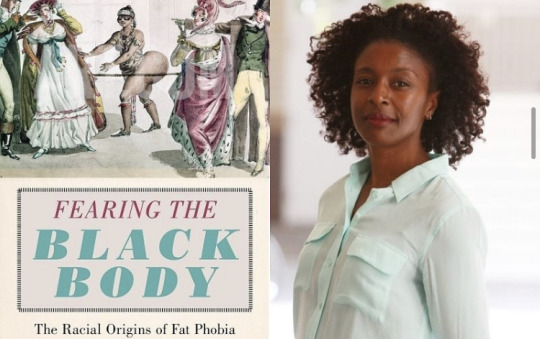
Sabrina Strings is an associate professor of sociology at the University of California, Irvine and the author of Fearing the Black Body: The Racial Origins of Fat Phobia, which exposes fatphobia’s roots in anti-blackness. Strings contributed an opinion story to The New York Times titled “It’s Not Obesity. It’s Slavery.” With Lindo Bacon (creator of HAES), she coauthored “The Racist Roots of Fighting Obesity,” published in Scientific American. Strings has a BA in psychology and an MA and PHd in sociology. This book is #1 on my to-read list!!
https://www.sabrinastrings.com
• Hannah Fuhlendorf (she/her), MA LPCC NCC

Hannah is a highly educated and experienced counselor whose work focuses on self acceptance, eliminating the effects of internalized oppression, and practicing through a HAES lens. She is a fat liberationist who puts out educational videos daily. Hannah is also married to a healthcare professional, and the two of them are working toward making the medical field more accessible to fat people in their local community, and offering education on how to be fat allies. I really admire Hannah and the work that she does!
@ hannahtalksbodies on IG and TikTok
• Tracy Cox (she/her)
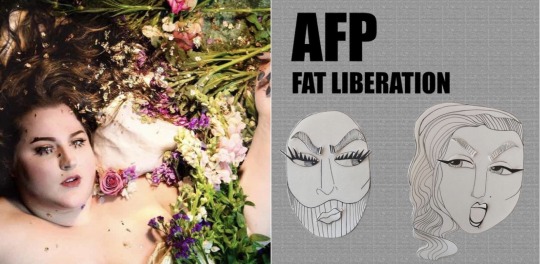
Tracy is an award-winning performer and artist, who co-created the web series “Angry Fat People” with Matthew Anchel, which takes a pop culture approach on serious issues faced by fat performers. She has been interviewed by the New York Times on fat politics and accessibility, and currently has a huge following on IG where she unpacks fat performance, fashion, and politics. You may know her as the creator of the ‘fat vanity’ trend on TikTok!
@ sparklejams on IG & TikTok
• Da’Shaun L. Harrison (they/them)
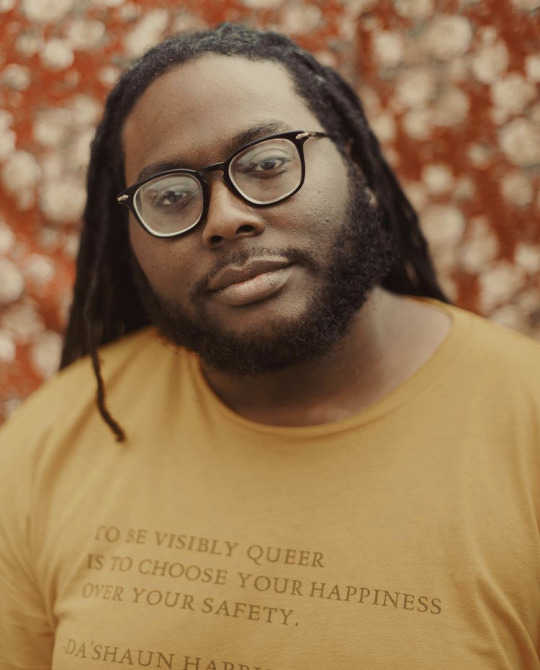
Da’Shaun is a non-binary abolitionist, community organizer, and writer. They are currently a managing editor and columnist at Wear Your Voice Magazine. They travel throughout the United States and abroad to speak at conferences, colleges, and lead workshops focused on Blackness, queerness, gender, class, religion, (dis)abilities, fatness, and the intersection at which they all meet. Da’Shaun is the author of the book Belly of the Beast: The Politics of Anti-Fatness as Anti-Blackness, which is expected to be published in July 2021. They have an incredibly enlightening social media presence as well!!
@ dashaunlh on IG and Twitter
• Lauren Buchness (she/her)

Lauren Buchness is one of my favorite artists. She’s a contemporary artist and fat activist based in Tucson, Arizona. By combining painting & performance, she aims to question Western standards of beauty and create conversations that alter preconceived notions about the fat body. Go check out her gorgeous work!!
@ ladybuchness on IG and TikTok
If you’re interested in learning about diet culture and intuitive eating, check out
Shana Minei Spence (she/her), MS RDN CDN
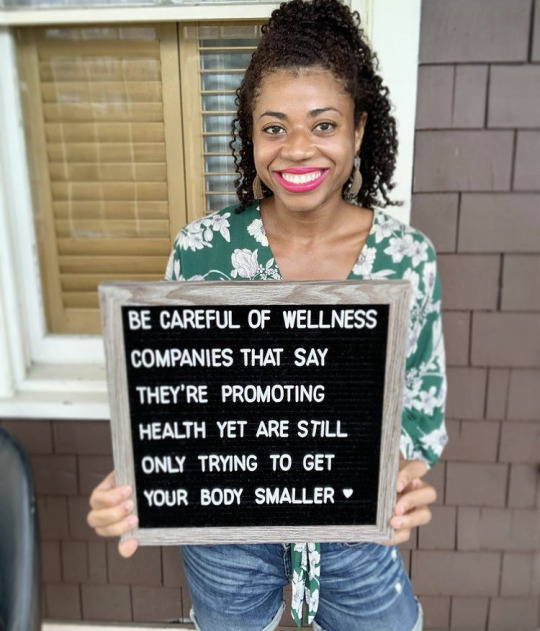
Shana is a Registered Dietitian Nutritionist who opposes food restriction and encourages intuitive eating! She spreads food positive daily messages on her platform. She used to work in fashion, but she left after being dissatisfied with the industry and went back to school to become involved in food policy and public health. She offers counseling on a HAES approach. I have much respect for Shana!
@ thenutritiontea on IG
And right here on tumblr (who was my personal introduction to fat lib) -
@ bigfatscience !!!
An anonymous fat liberationist. They share so many great resources, diving head-first into the scientific research of weight and health, they’ve found that the relation between the two is extremely complex. They tackle the biases of research in a system that profits off of fatphobia, and they offer a fat positive perspective based on scientific studies. Their blog serves as an easily accessible resource for fat folx and fat activists who want to learn about fat positive science to support their own personal interests/activism. Thank you for your work, bigfatscience!! (if you have questions for them, you will have a greater chance of getting a response with anon off!)
• Sonalee Rashatwar (she/they), LCSW MEd
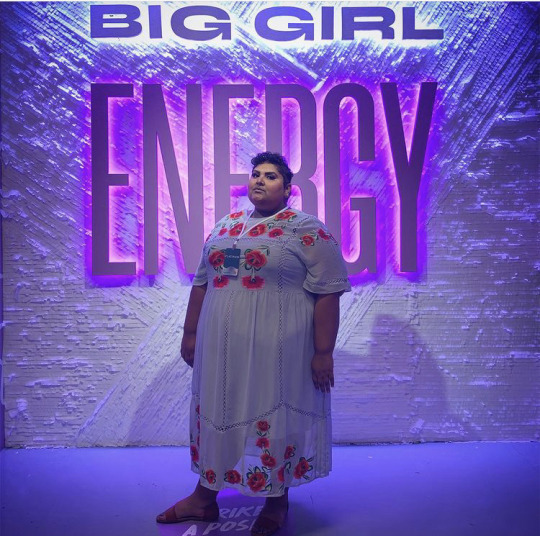
Sonalee is an award-winning clinical social worker, sex therapist, and grassroots organizer. They’re a superfat queer bisexual non-binary therapist and co-owner of Radical Therapy Center. Sonalee is specialized in treating sexual trauma, internalized fatphobia, immigrant kid guilt, and South Asian family systems, while offering fat positive sexual healthcare. Go, Sonalee!!
@ thefatsextherapist on IG
• Fat Rose (org)
Fat Rose organizes fat people, building a more radical fat liberation movement in strong relationship with other social movements, such as anti-fascism, anti-ableism, and anti-racism. Check them out on Facebook!
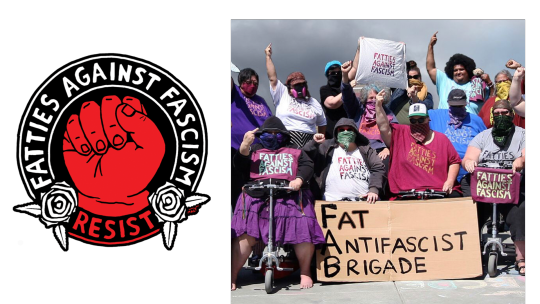
fatrose.org
Honorable IG mentions: (Some anti diet culture specific blogs in here, as well)
@fatangryblackgirl @msgigggles @thefatphobiaslayer @bodyimagewithbri @saucyewest @fatpositivetherapy @fatlippodcast @chairbreaker
BOOKS
And here’s an amazing list of fat-positive book recommendations from HannahTalksBodies!
Science & Health:
Health at Every Size by Lindo Bacon PhD
Body Respect by Lindo Bacon PhD and Lucy Aphramor PhD, RD
Secrets from the Eating Lab by Traci Mann PhD
Anti-Diet by Christy Harrison MPH, RD
Fat Liberation:
Fearing the Black Body by Sabrina Strings PhD
Fat Activism by Dr. Charlotte Cooper
Fat Politics by J. Eric Oliver
The Fat Studies Reader by Esther Rothblum (Editor) and Sondra Solovay (Editor)
Fat Shame by Amy Erdman Farrell
Self Acceptance:
The Body is Not an Apology by Sonya Renee Taylor
Things No One will Tell Fat Girls by Jes Baker
Eating in the Light of the Moon by Anita Johnson PhD
Happy Fat by Sofie Hagan
You have the Right to Remain Fat by Virgie Tovar
Thanks for reading! Please feel free to share this list of resources!
Image descriptions below.
1. [ID: A black and white photo of Bill Fabrey, a straight-sized, balding white man with thick black glasses wearing a suit and tie, standing at a poduim in front of a sign that reads, “NAAFA”. Beside the image is another photo of Fabrey, from his left side.]
2. [ID: A black and white photo of seven fat, female and gender non-conforming members of The Fat Underground, performing a recital.]
3. [ID: The cover of Sabrina Strings’ book, Fearing the Black Body: The Racial Origins of Fat Phobia. On the cover is an illustration of four upper-class white people in fancy colonial period clothing showing shock and disgust at a Black woman’s exposed body. Beside the book cover is a photo of Sabrina Strings, a straight-sized Black woman with dark brown curly hair wearing a blouse.]
4. [ID: Hannah Fulhendorf, a fat, white woman with straight hair dyed blue, wearing a black tank top and holding her shoulder while smiling brightly and looking into the camera.]
5. [ID: An artistic picture of Tracy Cox, a fat, white woman with long, straight brown hair, laying topless on a bed of flowers. There are flower petals placed strategically in her hair on her skin, and along her lower eyelid. Beside that image, is an image of the album cover for Angry Fat People, picturing two angry faces made out of white paper against a grey background. In the top left corner, black, bolded text that reads “AFP” and “FAT LIBERATION”.]
6. [ID: Da’Shaun L. Harrison, a fat, non-binary Black person with a beard, glasses, and long dreadlocks, wearing a shirt that reads, “TO BE VISIBLY QUEER IS TO CHOOSE YOUR HAPPINESS OVER YOUR SAFETY. -DA’SHAUN HARRISON” against a natural backdrop of autumn leaves.]
7. [ID: A watercolor painting by Lauren Buchness of a white and tattooed fat body, hands caressing abstract rolls of fat with wild blueberries and grapefruit between folds. Beside it is another Buchness watercolor painting of Black hands with long sharp nails, caressing the midsection of a fat Black body, with purple crystals growing out of the skin.]
8. [ID: Shana Minei Spence, a straight-sized, Black woman smiling with bright pink lipstick and her long wavy hair pulled back, wearing a floral pattern shirt and jean shorts. She is holding small marquee that reads, “BE CAREFUL OF WELLNESS COMPANIES THAT SAY THEY’RE PROMOTING HEALTH YET ARE STILL ONLY TRYING TO GET YOUR BODY SMALLER” and a heart symbol.]
9. [ID: Sonalee Rashatwar, a superfat, South Asian non-binary person with short black hair, wearing a long floral dress, standing in front of large glowing text that reads, “BIG GIRL ENERGY” against a coarse-textured wall.]
10. [ID: A circular logo with a red fist in the center, with text surrounding it that reads, “FATTIES AGAINST FASCISM” with roses separating the word “RESIST”. Beside it is another image, of eleven fat and superfat activists, standing and sitting on mobility scooters, holding fists and middle fingers in the air, wearing T-shirts and holding banners that both read, “FATTIES AGAINST FASCISM”. In front of the group is a large cardboard sign that spells the acronym “F.A.B.” which stands for “Fat Antifascist Brigade”.]
#fat activists#people#fat liberation#fat activism#fat positivity#resources#anti diet culture#anti-diet#anti-fatphobia#anti-racism#haes#masterpost
2K notes
·
View notes
Text
750. Transition into a Vegan Diet with the Help of Jacked Vegans' Julian Hierro
Julian Hierro is a plant-based fitness coach that helps entrepreneurs and busy professionals transition into a vegan diet. Julian became interested in the vegan lifestyle when he realized it has a low impact on the environment. When confronted with the suffering animals went through just to put food on our plates. Years later, after research and living the vegan lifestyle, he decided to start Jacked Vegans to help other vegans feel comfortable with their bodies and lead healthier happier lives.
[00:01 – 03:26] Transitioning to a Vegan Diet
I introduce guest, Julian Hierro
Julian shares his journey to the vegan lifestyle
Been a vegan for a little over eight months
How Jacked Vegans was born
The story behind his transition into veganism
[03:27 – 13:54] Let’s Get Fit!
Jacked Vegans’ role in the vegan community
To help vegans with their fitness journey
Julian walks us through how to reach your fitness goal with a vegan diet
Determine your goals (lose fat, gain muscles, etc.)
Shares amazing advice to help you follow through your goals and not give up
Structure your plan for the long term
Don’t forget about the maintenance phase
[13:55 – 19:32] Closing Segment
Julian leaves actionable steps that you can take today to get yourself on track to a healthier lifestyle
Get active
10,000 steps a day
Resistance training
Consume enough protein that’s healthy for you
Julian talks about his favorite vegan protein options
Connect with Julian online. See the links below
Tweetable Quotes:
“When you’re structuring a nutrition plan or training plan to improve the body composition, you’ve got to think about it long term. It shouldn’t be like a 2-month fix.” – Julian Hierro
“Dieting is really hard, and if someone’s telling you that dieting is not hard, that person’s lying to you. Because everyone has a hard time dieting.” – Julian Hierro
You can connect with Julian on Instagram. Check out the Jacked Vegans Vlogs on YouTube. Visit the Jacked Vegans website.
Leave a Review if you like this episode.
Keep up with the Podcast on Apple, Stitcher, Google, Spotify, and all other major podcast streaming platforms.
We also have our YouTube Channel, The Jason and Pili Project.
Visit our website and connect with us!
Check out this episode!
#Podcast#business#cashflow#Toro Real Estate#cashflow connections#clients#investing#mortgage#opportunities#realestate#reifoundation#stockmarket#thrivemarket#Bigger Pockets#equity firm
0 notes
Text
7 Ways to Reignite Your Yoga Passion
It's all good ... till, suddenly, you understand you're burnt out. You've hit the maintenance phase, where putting yourself with daily technique feels around as interesting as cleaning the meals, and hustling off to your regular Wednesday night course comes to be just one even more point to check off on your to-do listing. The concern is, Just what do you do about it?
' A yoga technique is much like a marriage or any type of various other lasting connection,' states Mebbie Jackson, 46, a long time yogi with a day-to-day vinyasa method in Knoxville, Tennesee. 'When life obtains busy and also you don't take note of yoga exercise like you should, you could get stuck in a rut. You need always to be functioning to bring brand-new power as well as brand-new methods into it to maintain it fascinating.'
Jackson actively searches for means to maintain her enthusiasm for yoga burning brightly. She located it one night in an Anusara Yoga workshop led by Martin Kirk at the neighborhood Glowing Body studio. Kirk is an educator that makes enthusiasm a main theme in his training. 'Do not simply exercise by memorizing, don't ever before shut down into dogma,' he encourages. 'Locate things you truly love about your practice, and explore them much more deeply. Allow that love inspire your method so it could inspire your life.'
This is just exactly what Jackson required to hear. 'I involved this workshop to recommit and also to challenge myself a bit more,' she claims. 'I have actually been exercising for 19 years, as well as I try to do it every day at residence. When you begin doing yoga exercise as everyday upkeep, you could neglect all the delicious things it can do, all the loftier suitables. I need to be advised.'
Do you have to be advised also? If so, consider these 7 concepts for reenergizing your practice. Weigh them over, try them out, or allow them influence your personal, better ideas. Maybe amongst them you'll discover just exactly what you need to follower the fires of your very own interest for yoga.
Dedicated to the one I love
Sometimes when you are burnt out or you're feeling that your practice has struck a plateau, it's due to the fact that you're driven to get a certain present that runs out reach, like Handstand,' states Adi Carter, an instructor who mixes Anusara, Ashtanga, Iyengar, and Jivamukti yoga with Pilates. 'It could be enormously helpful to dedicate your method to sensation thankful of what your body already can do, or appreciating the straightforward elegance of your breath.'
In her classes at Greenhouse Holistic in Brooklyn, Carter advises her students to begin their techniques by feeling appreciation for exactly how points are. From there, they could expand their focus external. 'Each time you tip on the floor covering, you have the possibility to ask yourself: 'Just what do I wish to see more of in my life?" Carter claims. 'It's a tough inquiry, however it's worth asking. As soon as you locate the solution, you could establish a purpose to make use of the power of your yoga exercise practice to aid make it genuine.'
For instance, you may wish to see even more flexibility in your mind and body, and also established an intent to pursue that goal. You could wish to devote your technique to creating peace in all your partnerships. Or you could pick something much more sensible, like reducing the amount of waste you develop. 'Any kind of intention is increased by your yoga method, so set a great one,' Carter advises.
Jodie Vicenta Jacobson, 32, usually invests a moment in Carter's course sending out love to kids around the world. 'When I stop, obtain peaceful, as well as take a breath, I'm reminded that yoga exercise is much bigger than me,' she states. 'I believe yoga exercise helps send my intent out and at the same time seal it in. It's remarkable each time.'
Let's get anatomical
When you're doing your Down Canine, you're possibly concentrating on all the bits and also items-- journalism through the palms, the internal spiral of the legs, the placement of the elbow creases. But are you truly, really in the posture? 'So numerous longtime yoga specialists obtain caught up in where their arms and also legs are supposed to be that they neglect ways to really feel the position,' says Susi Hately, a kinesiologist that assists in Composition and asana workshops throughout the United States as well as her indigenous Canada in addition to abroad. 'I want someone to comprehend just how their arm bone relocate its socket, or exactly how the pelvic band features. Once they comprehend how their body really functions, all the other alignment signs form.'
Hately is a big fan of yoga-oriented composition workshops and also initial makeup courses at neighborhood universities and also massage institutions. 'Any great essential makeup program will certainly educate you the basics: This muscle mass connects to that bone and moves that joint in this instructions or that direction,' she states. 'This is the essential to understanding just how the body actions, and also it could provide you significant understanding right into exactly how your yoga exercise method functions.'
When you have a basic understanding of composition, you'll recognize exactly what your instructor truly suggests when she chats concerning inside revolving your arms, or why your limited upper body muscles are avoiding you from straightening your arms overhead. With method, you may even be able to picture the cascade of cause-and-effect occasions that each muscle action sets into movement. And this expertise could instill your method with a brand-new level of inquisitiveness. 'When you understand the body as well as recognize exactly how as well as why it relocates the method it does, you're able to come at poses from the within out, instead of from the outdoors in,' Hately says.
Buddy up!
A conventional Ashtanga practice happens in a Mysore space, where trainees congregate to practice, yet don't necessarily do the same positions. There isn't one in Sebastopol, California, where Ann Austin lives. Austin, an educator at the regional Yoga exercise Workshop Ganesha, used a Mysore room to her students for a while, however there, she was the educator, not the trainee. She produced one with her pal Lucky Jamison. 'We make a little Mysore area wherever we are-- now, it remains in my barn,' Austin says. 'We gathering at 6 a.m. four times a week to exercise in our family tree. We head home, send our children off to school, and move on with our lives really feeling totally invigorated.'
Practicing together, both yogis give each various other with inspiration, comments, adjustments, detecting, and support. 'We maintain each other honest,' Austin states. 'When you are entrusted to your personal tools, you're much more most likely to just do just what you want or such as. We're not rigorous, however we both enjoy the method. We assist each other remember that.' They have traveled to yoga resorts together and have actually traded babysitting so that the various other could attend courses and also workshops. They likewise study the Yoga Sutra together.
' All you require is a buddy who shares your interest and also an area to do your practice because's separate from your everyday life,' Austin says. 'To be able to produce your very own routine and also have your very own method-- but not need to forge along the course alone-- that's vital.'
Worth the watch
When Kimberly Greeff, 29, seems like catching a yoga exercise class, it's not so easy. She's an active working musician, a mom, and also the co-owner of Chuckling Lotus Yoga exercise of Anchorage, Alaska. Greeff does what any type of tech-savvy, semi-isolated, time-pressed yogi would do: She downloads an inspiring podcast class. ' I make use of the podcasts to more my research study,' she discusses. 'I love taking a good class with a master instructor, yet up here in Alaska, we just don't obtain the large instructors coming via.'
Greeff teaches Forrest Yoga and pays attention to Ana Forrest's podcasts. Yet she's also a large follower of Alanna Kaivalya, a Jivamukti master instructor in New York who uses totally free and membership podcast classes. Other premium yoga podcasts are offered with iTunes, iHanuman, and Yoga Journal. DVDs can additionally be a powerful treatment for fatigue, states Yoga Journal adding editor Richard Rosen. 'There are a few that I view over and also over for their appeal, strategy, and also for brand-new suggestions regarding just how you could exercise,' he states. 'They actually have the potential to spark excitement for the method.'
Style makeover
It could be said without (much) irony that any kind of fallow duration is a possibility for self-reflection. Yoga exercise worths this process: Svadhyaya, or self-study, is a niyama ( awareness), among the eight limbs of timeless yoga. You could exercise svadhyaya by discovering various styles of yoga exercise, says Shannon Paige Schneider, the founder of Om Time workshops in Denver and Boulder.
' Make a checklist of all the styles offered to you, and also go as well as take those courses in a methodical method,' she advises. Try one new design every few weeks, and note after each what you suched as and also exactly what you didn't such as. 'If you typically practice an alignment-based style, you might like discovering how to flow in your technique. If you do vinyasa, you could locate real power standing still in an Iyengar class. And people who take a corrective class are constantly amazed that you could rest as well as let the yoga exercise do the job,' Paige Schneider says.
Feeling stuck in your technique is an indicator that you are yearning something, she adds. 'When you take a different class, you obtain an instantaneous fresh perspective-- you are being asked to use your body in brand-new means. It's an opportunity to discover a significant quantity concerning yourself.'
The experience does not have to be all excellent in order to profit you, either. 'Exactly what you don't such as is as vital as just what you simulate,' Paige Schneider claims. 'You may take a warm yoga class and dislike it. After that you would certainly understand that you require something much more cooling as well as soothing. Stimulates of knowledge originated from great experiences as well as bad ones.'
In private
Sometimes the ideal way to climb up off a practice plateau is to go deeper by taking an exclusive lesson.
' When you are feeling stuck, you would certainly do better to spend your money on a personal session compared to on a five-class pass,' states Om Time's Paige Schneider. Possibly you're really feeling irritated by a position. Maybe you prepare to progress in your technique but aren't sure exactly how. Possibly you require aid developing new sequencing that obtains you fired up regarding yoga exercise once again. Exclusive courses offer you a possibility to ask questions you never ever reach in a course setup. 'You can be in an area with a yoga educator everyday with 40 other students for many years and never ever understand you go down the inner upper leg in Lunge,' Paige Schneider says. 'In an exclusive, the instructor will make sure you grasp the action, as well as you may understand that maintaining your inner thigh raised is the crucial to transforming all your standing postures.'
Private lessons can be costly, rates range from $50 to $250 for one hr. Consider it a financial investment in your yoga exercise future. Prior to you reserve your consultation, see to it you've obtained the appropriate educator. Paige Schneider recommends asking three inquiries-- and also looking for enjoyment in the answers: Do you give many private lessons? Do you prefer to offer private lessons? Do you have the moment to offer personal lessons? 'These are more crucial compared to How much does it set you back?' she says.
Follow your leader
It's an essential tenet of yoga exercise that the solution to all our questions-- including How do I drink off these doldrums?-- could be found within. The issue is, it takes practice to recognize the concerns we have to ask as well as to hear the responses. Paradoxically, as we learn self-guidance, most of us take advantage of the guidance of a sensible teacher-- an expert, if you will.
' A genuine master can see just what the student needs as well as use the methods at the correct time,' claims Yogiraj Alan Finger, the co-creator (with his dad, Kavi Yogi Swarananda Mani Finger) of Ishta Yoga. 'Severe pupils should look for an instructor who can help them understand just how everything works-- exactly how asana influences the gunas, doshas, chakras, and the subtle body. When you have that deepness of understanding, you will never ever come to be bored with the positions. You'll never not intend to do it.'
They say that the instructor will appear when the pupil is all set. Still, it doesn't harmed to provide destiny a hand. So go looking, in publications, on video clips, throughout the Web. Search in classes, workshops, and also meetings. When you find an instructor whose job reverberates with you, do whatever it requires to find out whatever you can from him.
You can pick a duration of time, state a year, to devote to one instructor, and just do it, if for nothing else reason than this: You might simply change your life.
Hillari Dowdle, a previous Yoga Journal editor, creates in Knoxsville, Tennessee.
1 note
·
View note
Text
Top Reads of 2017
Here’s a list of the top books I read in 2017. In favorite order 10 to 1
10. In Search Of Excellence - Tom Peters (1982)
Where May, Watts, and Frankl lay philosophical foundations for your mind, Tom Peters sets the stage for the organization.
At a time when IBM, General Motors and other dinosaur power houses reigned the scene, Peters goes deep into the underpinnings of assembling a massive collection of people working together. Keep in mind that research for this book started in 1977 and the principles still hold true today.
Who should read this book? The business nerds and students of organizational philosophy. I know that’s all of you right?
“Many of the innovative companies got their best product ideas from customers. That comes from listening, intently and regularly.”
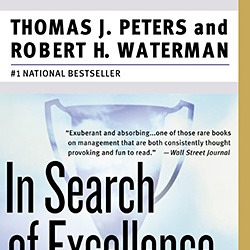
Amazon
9. Hardball - Chris Matthews (1988)
This was standard reading in highschool, but of course I didn’t appreciate it enough. With a couple years of work and exposure to corporate politics under my belt, the 2nd reading of Hardball was a lot more gripping.
Chris Matthews goes into details of political maneuvers he’s seen over the course of his career. Better yet, he backs each one up with real world examples.
Who should read this book? Anyone gearing up for corporate politics or a life in the public view.
“I’ve lived across the street from you for 18 years…I shoveled your walk in the winter. I cut your grass in the summer…I didn’t think I had to ask you for your vote. He never forgot her response. ‘Tom, I want you to know something: people like to be asked.’”
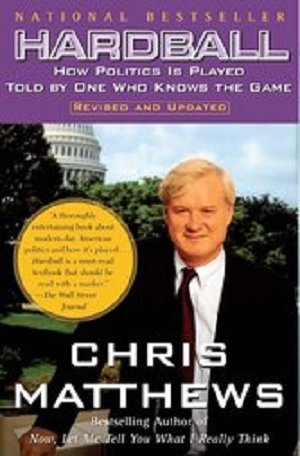
Amazon
8. The 7 Habits Of Highly Effective People - Stephen R. Covey (1989)
Stephen starts off 7 Habits with a section on “paradigms.” Simply, how do you look at the world? Through what lense do you evaluate your experience?
He goes on to explore foundational traits of people who get things done while bringing it home to each persons personal mission.
Who should read this book? Anyone who wants a strategic view, rather than tactical, for finding your life’s “Northstar” metric.
“Most people do not listen with the intent to understand; they listen with the intent to reply.”
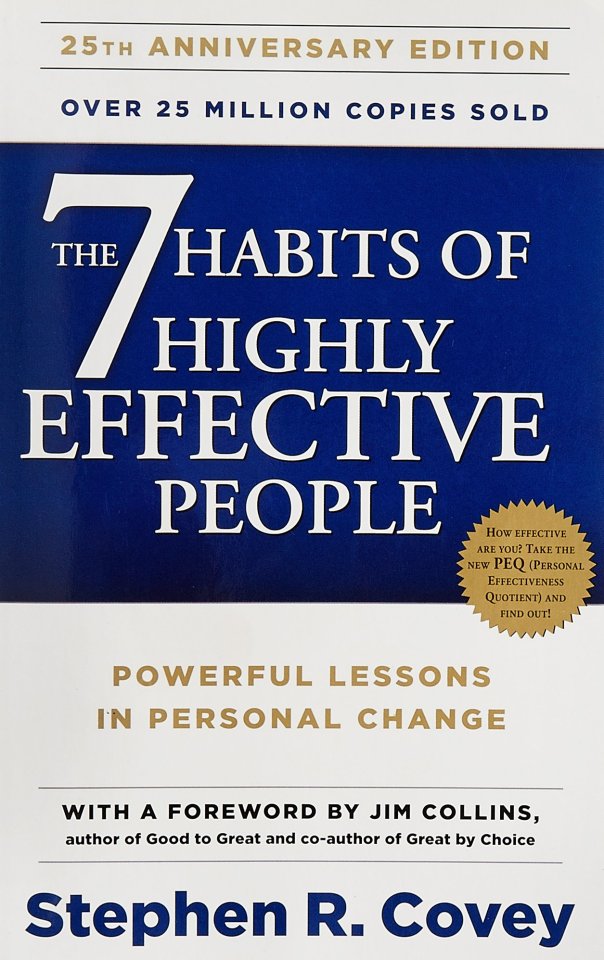
Amazon
7. Tools of Titans - Tim Ferris (2016)
“Wow that was great advice”...pretty much what I thought every page of this book. It’s long (700+ pages) account of 100+ people who’ve done amazing things and experienced extraordinary growth. Tim distills the most juicy nuggets of information from years of podcasts and interviews into this books three sections: Health, Wealth, and Wisdom.
No matter who you are, you’re going to find a new role model somewhere in these pages.
Spoiler alert: The common thread behind every successful person I’ve ever read about comes down to two words: energy & action
Who should read this book? Anyone who wants to hear about the least common denominator of success through various endeavors.
“Judge a man by his questions rather than his answers.” —Pierre-Marc-Gaston”
“Investing in yourself is the most important investment you’ll ever make in your life. . . . There’s no financial investment that’ll ever match it, because if you develop more skill, more ability, more insight, more capacity, that’s what’s going to really provide economic freedom. . . . It’s those skill sets that really make that happen.”
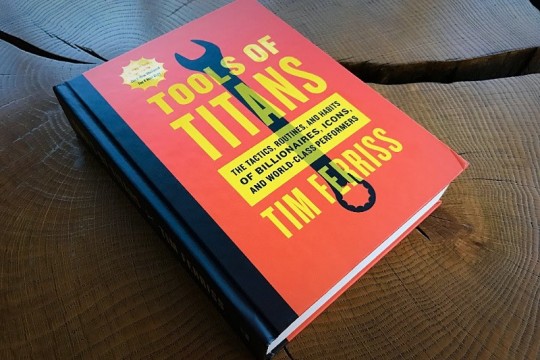
Amazon
6. Benjamin Franklin: An American Life - Walter Isaacson (2003)
Ben Frank, where do you begin? The guy left behind a legacy filled with adventure, discovery and a firm grasp of life.
I enjoyed that while learning about BF, you got a great view into what life was like in the 1700s as well as an alternative view of the American Revolution.
Who should read this book? The history buff.
“Knowledge, he realized, “was obtained rather by the use of the ear than of the tongue.”
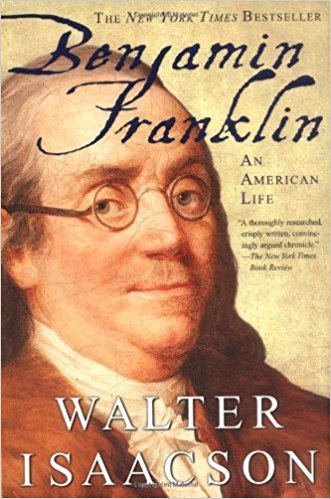
Amazon
5. Zen And The Art Of Motorcycle Maintenance - Robert M. Pirsig (1989)
A long and difficult book that I couldn’t put down. The topics were as high up in the alpine meadows of philosophy as the metaphors laid throughout the story. Many people told me this book was about “quality” but it was so much more than that.
Phaedrus simply had his mind turn inside out. A circle that inverts, a hand that grasped itself, a mind that broke through consciousness.
“You look at where you're going and where you are and it never makes sense, but then you look back at where you've been and a pattern seems to emerge.”
“Is it hard?' Not if you have the right attitudes. Its having the right attitudes thats hard.”
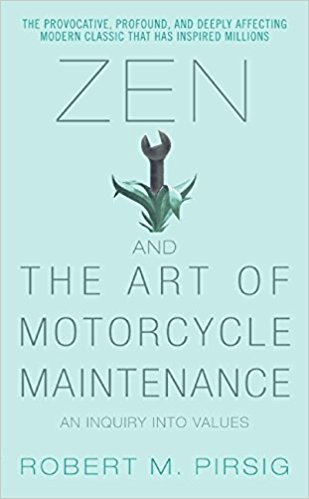
Amazon
4. 100-Year-Old-Man - Jonas Jonasson (2012)
Cute fictional read about an old man goes on an adventure and decides not to return home. This one reads like Forrest Gump, a likable oblivious main character traveling the world while playing cameos in major historical events.
Who should read this book? Someone looking for an easy break from their slew of business non-fiction reads.
“Never try to out-drink a Swede, unless you happen to be a Finn or at least a Russian.”
“...you'll see that things will turn out like they do, because that is what usually happens - almost always, in fact”
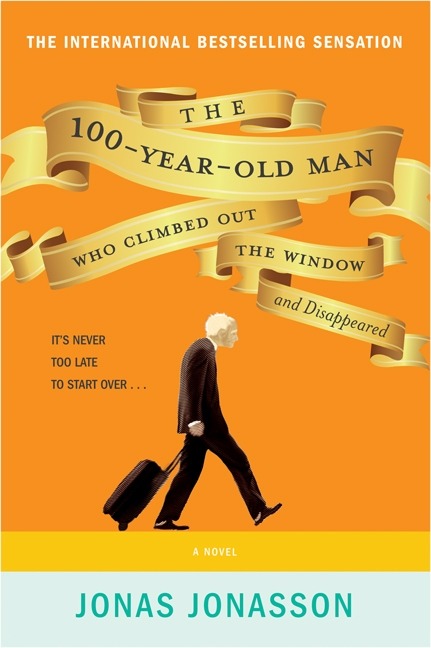
Amazon
3. Zen In The Art Of Archery - Eugene Herrigel (1948)
After a bunch of Alan Watts and Zen/Motorcycle, Zen In The Art Of Archery was a natural next step. A german professor goes to Japan to learn the ways of Zen from a master.
This book blew my mind with the language of a feeling that happens when a person connects with the oneness of the world. A feeling that goes beyond words.
Don’t go into it dry, warm yourself up with other philosophy reading beforehand. It’s hard to connect with this book cold turkey.
Who should read this book? Anyone on the tail end of an eastern philosophy phase.
“Don't think of what you have to do, don't consider how to carry it out!" he exclaimed. "The shot will only go smoothly when it takes the archer himself by surprise.”
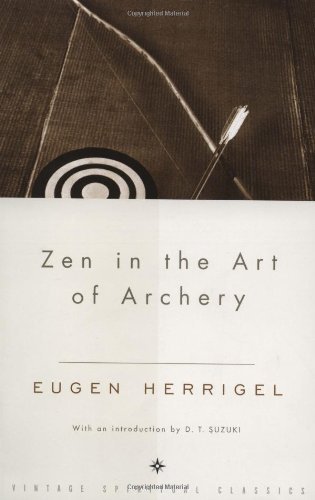
Amazon
2. American Kingpin - Nick Bilton (2017)
Real life racketeering, drugs, murder, Bitcoin, cybercrime and...San Francisco. What else could be better than that for someone in the Bay Area? This book will leave your on the edge of your seat as you watch Ross create a business from his bedroom that ended up doing $1B+ in sales of illegal items.
Bilton does a great job keeping the reader engaged through movie-like scene transitions and build ups. I’ll be surprised if this story doesn’t become a movie in the next 5 years. I hope Christopher Nolan or Scorsese gets it.
Who should read this book? Anyone remotely interested in cryptocurrency or rag-to-riches crime stories.
Extra: Here are two internet breadcrumbs that got Ross caught. 1. His first promotion of the site in Jan ‘11 2. Him asking a coding question on stackover flow about Tor/php
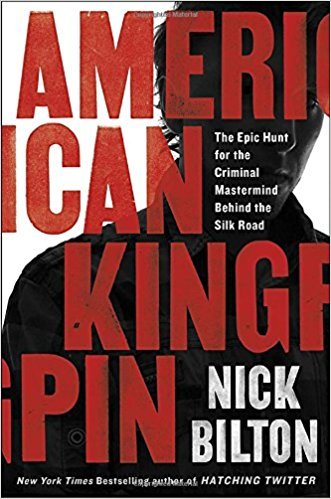
Amazon
1. The Autobiography of Malcom X - Malcom X (1965)
Absolutely amazing book that shows how Malcom X came to be through his own words. While you can’t take everything he says for truth, this book is an amazing perspective that connects many dots throughout the civil rights movement.
Malcom X was ~90% done with this book before he was assassinated in New York. The amount of passion that flows through his words tell a tale of energy that always found an outlet, either through crime, development, or civil rights.
Who should read this book? Anyone ready for a heavy read on the transformational story of a civil rights leader.
“The main thing you got to remember is that everything in the world is a hustle.”
“So early in my life, I had learned that if you want something, you had better make some noise.”
“The ability to read awoke inside of me some long dormant craving to be mentally alive.”
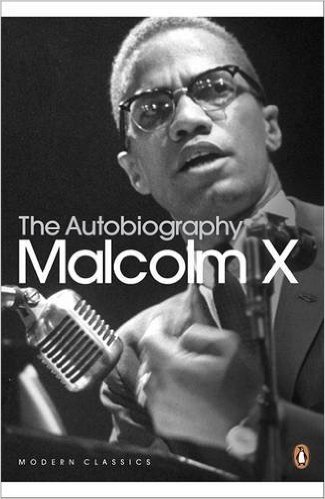
Amazon
1 note
·
View note
Link
Trigger warning: Eating disorders, weight and diet talk, and statistics that frequently make people who want to lose weight feel really hopeless
One of the best things I’ve heard this week was an episode of Maintenance Phase, where they talk to a clinician who treats eating disorders and just completed her doctoral dissertation on “atypical anorexia”, which is where people are full-on anorexic except they’re not thin.
Which is, you know, pretty indistinguishable from “a fat person doing what everyone in the world is TELLING them to do, except as it turns out you can experience all the really bad health symptoms of extreme starvation while still being fat.” It breaks all our society’s preconceptions about “calories in, calories out,” because how can someone GAIN weight on a starvation diet? But as it turns out, the human body has absolutely amazing capacities for surviving famine--especially if it has a lot of experience at surviving with very limited food intake.
It’s a seriously under-researched area and really good stuff.
(Maintenance Phase is a podcast that examines how the weight-loss industry misuses science. Its hosts believe that since a) 98% of dieters fail to sustain significant weight loss over 5 years so weight loss is not a viable goal, and b) weight and health are not the same thing, maybe c) we should change the societal systems that routinely discriminate against fat people and find public health solutions that aren’t just “treating fat people like shit”, expanded on in host Aubrey Gordon’s book)
And if you’re going “But what am I supposed to DO if I can’t lose weight?!”, the best evidence we have right now points to Health at Every Size.
219 notes
·
View notes